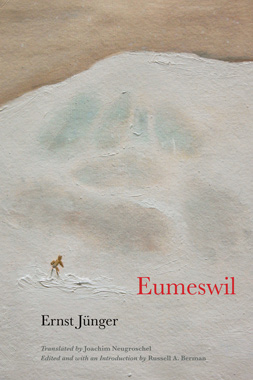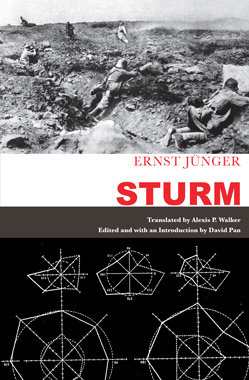Telos Press is delighted to announce that two of its recent book publications, Eumeswil and Sturm, both by Ernst Jünger, have received honorary mentions in the general fiction category in the 2015 London Book Festival. Congratulations to editors Russell A. Berman and David Pan and to Sturm’s translator, Alexis P. Walker!
You can save 20% on these and other Telos Press books by purchasing them in our online store. Just use the coupon code BOOKS20 during checkout. When you order directly from the Telos Press website, you make it possible for us to publish the kinds of books that you want to read. As a small independent publisher, we rely on the support of our readers to continue producing new, challenging works in politics, philosophy, and critical theory. Visit our store for a complete listing of our books.
Translated by Joachim Neugroschel
Edited and with an Introduction by Russell A. Berman
Eumeswil, ostensibly a post-apocalyptic science fiction novel, is effectively a comprehensive synthesis of Ernst Jünger’s mature thought, with a particular focus on new and achievable forms of individual freedom in a technologically monitored and managed postmodern world. Here Jünger first fully develops his figure of the anarch, the inwardly liberated and outwardly pragmatic individual, who lives peacefully in the heart of Leviathan and is yet able to preserve his individuality and freedom. Composed of a series of short passages and fragments, Eumeswil follows the reflections of Martin Venator, a historian living in a futuristic city-state ruled by a dictator known as the Condor. Through Venator, the prototypical anarch, Jünger offers a broad and uniquely insightful analysis of history from the post-historic perspective and, at the same time, presents a vision of future technological developments, including astonishingly prescient descriptions of today’s internet (the luminar), smartphone (the phonophore), and genetic engineering. At once a study of accommodation to tyranny and a libertarian vision of individual freedom, Eumeswil continues to speak to the contradictions and possibilities inherent in our twenty-first-century condition.
Translated by Alexis P. Walker
Edited and with an Introduction by David Pan
Set in 1916 in the days before the Somme offensive, Ernst Jünger’s Sturm provides a vivid portrait of the front-line experiences of four German infantry officers and their company. A highly cultivated man and an acute observer of his era, the eponymous Lieutenant Sturm entertains his friends during lulls in the action with readings from his literary sketches. The text’s forays into philosophical and social commentary address many of the themes of Jünger’s early work, such as the nature of war, death, heroism, the phenomenon of Rausch, and mass society. Originally published in installments in the Hannoverscher Kurier in 1923, Sturm fell into obscurity until 1960, when it was re-discovered and subsequently re-published by Hans Peter des Coudres, a scholar of Jünger’s work. This translation—the first to be published in English—brings to the English-speaking world a work of literature of interest not only to students of Jünger’s work and of World War I, but to any reader in search of a powerful story of war and its effects on the lives of the men who endure it.










